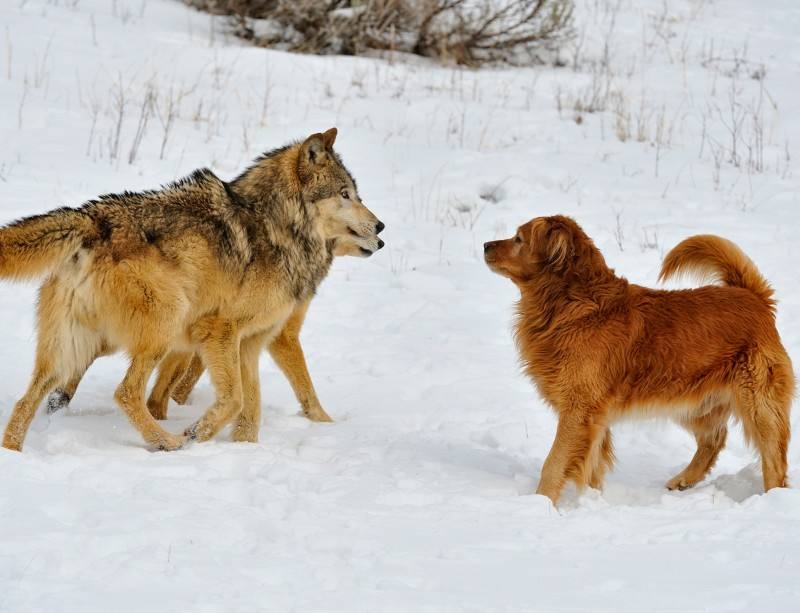Wolves Would Make Better Gamblers Than Dogs, or At Least Take More Risk
Posted on: September 4, 2016, 10:14h.
Last updated on: September 3, 2016, 10:29h.

Wolves take greater risks when hunting for food than canines, a new study finds.
The Wolf Science Centre in Ernstbrunn, Austria, a research institute where dogs and wolves live harmoniously in the wild, says wolves routinely take more risks than their four-legged tamed counterparts when searching for food.
Researchers challenged wolves and dogs to decide between two covered potential food sources. One bowl was guaranteed to have a bland food pellet, while the other bowl featured a fifty-fifty chance of being either tasty meat or an inedible stone.
Dogs went with the guaranteed treat 42 percent of the time, while wolves chose it just 20 percent. Wolves went with the riskier option 80 percent of the time.
“This difference, which seems to be innate, is consistent with the hypothesis that risk preference evolves as a function of ecology,” study author Sarah Marshall-Pescini said.
“Wild wolves hunt large ungulates, a risky strategy, not only because hunts often fail, but also because these prey animals can be dangerous,” Marshall-Pescini explained. “Whereas free-ranging dogs, which make up 80 percent of the world’s dog population, feed mostly by scavenging on human refuse, a ubiquitous, unlimited resource.”
For what it’s worth, my domesticated dog takes no risk whatsoever in hunting for food, and simply expects her dish to be full at 5 pm sharp.
Gambling Impact
In 2013, a study presented at the annual Society for Neuroscience conference revealed how the human brain functions in compulsive gamblers.
The study found that gambling addicts aren’t greedier than the rest of the human population, but simply have a strong desire to congregate money. They are also addicted to taking risk.
But for the majority of us, we take a guaranteed $100 over a 50 percent chance at winning $200 or busting. Like man’s best friend, humans have become conditioned to minimize risk when given the option.
Lowering risk, especially risk that comes with grave consequences such as food resources, is one factor why humans today live longer than our prehistoric ancestors.
Canines are thought to have evolved from wolves between 18,000 and 32,000 years ago. Today, the average lifespan of a dog is between 10-13 years, while wolves tend to live between six and eight years.
Calculated Risk
Just because the study findings show wolves tend to take more risk than dogs, it doesn’t mean all frequent gamblers share the same mental traits with the carnivorous animal.
Marshall-Pescini’s methodology pertains only to games of pure chance, such as slot machines, bingo, and the lottery. For many other traditional casino games, there is an inherent element of skill involved.
Blackjack, for instance, comes with odds that can both improve and worsen based on one’s expertise with the card game. A skilled blackjack player can decrease the casino’s house edge to a mere 1.15 percent.
Taking risk at blackjack tables is certainly not equal to sitting down with a bucket of quarters. But regardless, the wolves and dogs study provides a unique glimpse into how animals evaluate risk.
Related News Articles
Las Vegas Golden Knights Strike In-Arena Branding Partnership with William Hill
Garth Brooks Las Vegas Residency Battle Intensifies Following Park MGM Show
UK to Discuss Gambling Bonus Regulations as Public Backlash Intensifies
Most Popular
FTC: Casino Resort Fees Must Be Included in Upfront Hotel Rates
Genovese Capo Sentenced for Illegal Gambling on Long Island
NBA Referees Expose Sports Betting Abuse Following Steve Kerr Meltdown
UPDATE: Former Resorts World & MGM Grand Prez Loses Gaming License
Most Commented
-
UPDATE: Whiskey Pete’s Casino Near Las Vegas Closes
— December 20, 2024 — 31 Comments -
Caesars Virginia in Danville Now Accepting Hotel Room Reservations
— November 27, 2024 — 9 Comments -
UPDATE: Former Resorts World & MGM Grand Prez Loses Gaming License
— December 19, 2024 — 8 Comments -
FTC: Casino Resort Fees Must Be Included in Upfront Hotel Rates
— December 17, 2024 — 7 Comments
















No comments yet